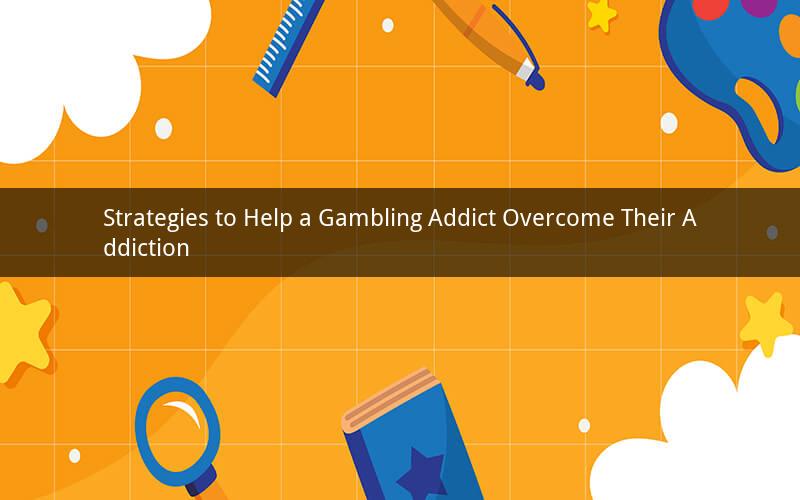
Gambling addiction is a serious issue that affects millions of people worldwide. If you know someone struggling with this problem, it's important to understand how you can help them overcome their addiction. This article will explore various strategies to assist a gambling addict in their journey towards recovery.
1. Educate Yourself About Gambling Addiction
To effectively help a gambling addict, it's crucial to educate yourself about the nature of their addiction. Understanding the psychological, emotional, and social aspects of gambling addiction can help you provide the right support.
1.1. Recognize the Signs of Gambling Addiction
Gambling addiction is characterized by an inability to control gambling behavior, leading to significant negative consequences. Some common signs include:
- Increasing the amount of money or time spent gambling
- Feeling restless or irritable when unable to gamble
- Continuously chasing losses
- Lying to family, friends, or healthcare professionals about gambling activities
- Using gambling as a way to cope with stress or negative emotions
1.2. Understand the Psychological Factors
Gambling addiction often stems from underlying psychological factors, such as:
- Low self-esteem
- Depression
- Anxiety
- Trauma
- Co-occurring disorders, such as substance abuse or other mental health issues
2. Encourage Them to Seek Professional Help
Professional help is essential for a gambling addict's recovery. Encourage them to seek treatment from a therapist, counselor, or psychiatrist specializing in addiction and mental health.
2.1. Find the Right Treatment Program
Research various treatment programs and find one that best suits the individual's needs. Options include:
- Individual therapy
- Group therapy
- Residential treatment
- Outpatient treatment
- 12-step programs
2.2. Support Them Through Treatment
Be a supportive presence throughout the treatment process. Offer to accompany them to appointments, provide transportation, and listen to their concerns and progress.
3. Encourage Healthy Coping Mechanisms
Gambling addicts often turn to gambling as a way to cope with stress or negative emotions. Encourage them to develop healthy coping mechanisms, such as:
- Exercise
- Meditation
- Creative hobbies
- Joining support groups
- Developing new social connections
4. Address Financial and Legal Consequences
Gambling addiction can lead to severe financial and legal consequences. Help the individual address these issues by:
- Encouraging them to seek financial counseling
- Assisting them in creating a budget
- Exploring legal options, such as seeking the help of an attorney
5. Be Patient and Understanding
Recovery from gambling addiction is a long and challenging process. Be patient and understanding as the individual navigates their journey. Avoid judgment, criticism, or enabling behaviors that may hinder their progress.
5.1. Offer Emotional Support
Provide emotional support by listening, validating their feelings, and reassuring them that recovery is possible. Offer a non-judgmental space where they can express their fears, frustrations, and triumphs.
5.2. Encourage Relapse Prevention
Relapse is a common part of the recovery process. Encourage the individual to develop relapse prevention strategies, such as:
- Identifying triggers and developing coping strategies for them
- Maintaining a strong support network
- Staying connected with their therapist or counselor
5.3. Celebrate Progress
Celebrate the individual's progress, no matter how small. Recognizing and acknowledging their achievements can boost their motivation and confidence.
In conclusion, helping a gambling addict overcome their addiction requires a combination of education, support, and encouragement. By understanding the nature of their addiction, encouraging professional help, promoting healthy coping mechanisms, addressing financial and legal consequences, and providing emotional support, you can play a crucial role in their recovery journey.
Questions and Answers:
1. Q: Can I help a gambling addict on my own without professional help?
A: While you can offer support and encouragement, professional help is essential for treating gambling addiction. A therapist or counselor can provide the necessary tools and strategies for recovery.
2. Q: How long does it take to recover from a gambling addiction?
A: Recovery from gambling addiction is a lifelong process. While some individuals may experience significant progress within a few months, others may require years of ongoing treatment and support.
3. Q: Can a gambling addict fully recover?
A: Yes, it is possible for a gambling addict to fully recover. With the right treatment, support, and commitment to change, individuals can overcome their addiction and lead a fulfilling life.
4. Q: How can I help my loved one who is struggling with gambling addiction and also has a substance abuse problem?
A: It's important to address both issues simultaneously. Encourage your loved one to seek treatment for both gambling and substance abuse. A therapist or counselor can help them develop strategies to manage both conditions.
5. Q: What can I do if my loved one is unwilling to seek help for their gambling addiction?
A: It can be challenging to help someone who is unwilling to seek help. Continue to offer support and encourage them to consider treatment. However, it's important to set boundaries and protect yourself from enabling behaviors.